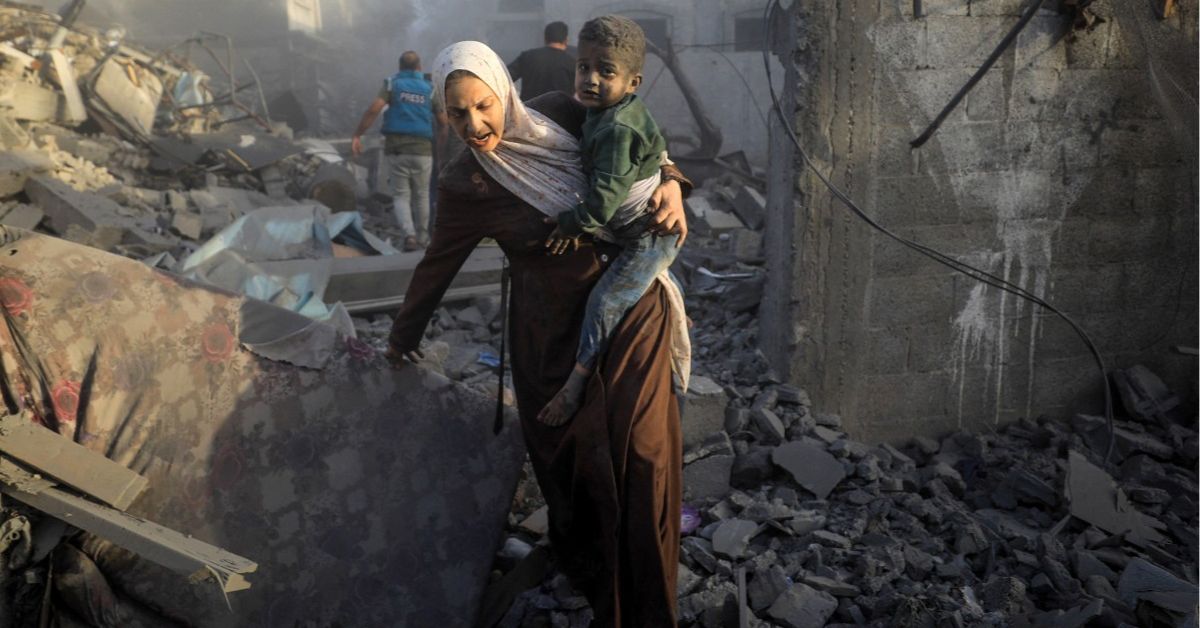WASHINGTON — A latest report by the Institute of International Finance has outlined the potential ramifications of military operations in the Gaza Strip.
The report presents three distinct scenarios, ranging from contained operations targeting Hamas leadership to a full-scale regional conflict. Each scenario carries significant economic and geopolitical implications for the Middle East and North Africa (MENA) region.
Lebanon, still reeling from previous conflicts, faces considerable risk should the situation escalate. Political paralysis and Hizbollah’s influence further complicate the decision-making process for the Lebanese people.
Also Read Exclusive reports on Gaza-related developments
Jordan and Egypt also face economic complications due to the conflict. Jordan, with a significant Palestinian population, wrestles with potential for increased social unrest and economic challenges. Egypt, already facing economic difficulties, may experience further setbacks, including decreased tourism, currency uncertainties, and disruptions in its hydrocarbon exports.
GCC economies may remain relatively insulated from direct economic harm, but political and diplomatic relations with Israel will likely face strain. The report suggests that key Arab countries, including Saudi Arabia, will seek to play a role in resolving the conflict, potentially impacting diplomatic and trade relations with Israel.
At A Glance Lebanon's Vulnerability * At high risk if conflict escalates, compounded by political paralysis and Hizbollah's influence. * Economic devastation could be prolonged by a war with Hizbollah. Jordan and Egypt's Economic Risks * Jordan faces social unrest and economic challenges due to a large Palestinian population. * Egypt's economy may suffer from decreased tourism, currency issues, and disrupted hydrocarbon exports. GCC's Relative Insulation and Diplomatic Strains * GCC economies less directly harmed economically. * Political and diplomatic relations with Israel could be strained. Impact on Lebanon and Israel's Economies * Contained operations in Gaza could still devastate Lebanon's economy. * Full-scale conflict could lead to economic contraction and infrastructure damage in Israel. Israel's Economic Dilemmas * Mobilization of reservists could impact sectors, especially technology. * Natural gas exports at risk; infrastructure could suffer from regional conflict. Economic Complications for Jordan and Egypt * Jordan's economic challenges include potential refugee influx and social unrest. * Egypt's tourism and hydrocarbon exports could decline, exacerbating economic issues. Implications for GCC Countries and Saudi-Israeli Relations * GCC's oil exports could keep their economies stable. * Saudi Arabia's tentative agreements with Israel could be suspended; seeks additional concessions for Palestine. Influence of Iran and Public Support for Palestine * Iran's support for Hamas affects GCC's political stance. * Strong public backing in Arab nations for Palestinian statehood ambitions.
The three scenarios
According to the report, if the contained military operations are limited to the Gaza Strip targeting Hamas leadership, or if the conflict escalates into a larger, prolonged regional war, it could devastate Lebanon’s already drained economy. Concurrently, it would result in slower economic activity, wider twin deficits, and a drop in foreign exchange reserves in Egypt and Jordan.
The report, titled ‘War in Gaza: The Fallout for the MENA Region,’ presents three possible scenarios:
1. Contained military operations limited to the Gaza Strip, targeting Hamas leadership.
2. The conflict escalates into a larger, prolonged regional war.
3. An agreement on a ceasefire followed by the release of all hostages and negotiations for peace.
With air and artillery support, Israel retrieves hostages, targets Hamas leadership, and destroys Gaza’s military infrastructure in Scenario 1. This scenario confines warfare to Gaza. A modest ground invasion of Gaza could be brutal and challenging.
In Scenario 2, Israel initiates an extensive ground campaign, and regional violence escalates. In an urban context with a 500-km underground tunnel network, a swift victory seems unlikely. This scenario increases the possibility of war with Hizbollah in Lebanon or other ‘Resistance Axis’ groups in Syria, Iraq, or Yemen. A conflict with Hizbollah could last over six months, causing regional unrest. The relocation of the 2.5 million Palestinians in Gaza and the fate of over 200 Hamas hostages remain uncertain.
Scenario 3 entails a ceasefire, hostage release, and peace negotiations.
Implications of Scenario 2:
Expecting the worst, the IIF report states that the implications for the region depend on the extent and duration of the conflict and the countries involved. Most Lebanese prefer to stay out of the current conflict to avoid further devastation. Memories of the damages from the 34-day war in 2006 between Hizbollah and Israel still linger. However, due to political paralysis and Hizbollah’s influence, Lebanon’s participation in the war is not at the discretion of its people or authorities, the report indicates.
Israel’s strong response to Hizbollah’s increased involvement in the conflict could damage southern Lebanon and critical cities. This would severely impact Lebanon’s economy and potentially destroy the remaining infrastructure amidst a financial crisis. War-related capital stock losses could delay economic recovery by nearly a decade. Real GDP may decrease by 4 percent in 2023, with a 15 percent drop in Q4, and a 30 percent decline in 2024. Increasing current account and fiscal deficits could deplete foreign exchange reserves, potentially leading to the country’s dissolution.
Impact on Israel’s economy
The report indicates that Israel prefers not to escalate the war; however, a full-scale ground assault on Gaza could lead to a larger, prolonged regional conflict. Such a scenario would significantly affect the economy, reducing private consumption, investment, and net exports, exacerbated by a constrained labor supply as the government has mobilized about 350,000 reservists (8 percent of the workforce). This substantial workforce reduction would harm various sectors, notably the technology sector, which is a key growth driver in Israel.
Natural gas exports could be disrupted due to the suspension of offshore production. An intensified conflict with Hizbollah or Iran could damage Israel’s infrastructure and result in additional casualties.
A protracted regional conflict lasting over six months could contract the Israeli economy by at least 4 percent in the fourth quarter and 5 percent in 2024. The anticipated current account surplus of 4 percent of GDP may turn into a slight deficit in 2024, while the budget deficit could increase to 4 percent. The substantial foreign exchange reserves could plummet if non-resident inflows, including FDI and portfolio investments, decrease amid security concerns.
Economic complications for other countries
The conflict poses a threat to Jordan’s relationship with Israel. While condemning Israel’s actions, Jordan has refrained from accepting Palestinian refugees. Some in Jordan, where Palestinians make up over 60 percent of the population, suspect Israel aims to trigger a humanitarian crisis to push Palestinians from Gaza and shift the burden of displaced people to Jordan and Egypt, heightening the country’s hesitancy to accept more refugees.
Jordanian officials consider joining the Palestinian resistance risky, especially if the conflict spreads to the West Bank, home to 3 million Palestinians. Prolonged hostilities could have significant economic consequences.
According to the report, reduced tourism revenue (13 percent of GDP in 2022) and decreased private investment due to social unrest could lead to a minor contraction in production, over 20 percent unemployment, and a wider economic disparity in Jordan.

A prolonged war will also damage Egypt’s economy, which has been grappling with challenging macroeconomic conditions since mid-2022, including double-digit inflation, exchange rate pressures, dwindling foreign exchange reserves, portfolio outflows, and excessive debt. The conflict in Gaza could negatively affect tourism, particularly in the popular resorts of Sinai, which have been recovering recently.
Increased political and currency uncertainties could adversely affect foreign direct investment inflows. The potential suspension of Israeli gas imports, which constitute over half of Egypt’s hydrocarbon exports, is expected to reduce export revenues. Additionally, social unrest may impede economic recovery, leading to slower growth, a wider current account deficit, reduced non-resident inflows, smaller foreign exchange reserves, and a higher fiscal deficit.
If oil exports remain undisrupted, GCC economies may not suffer severe harm from the war, but authorities may face renewed challenges in mending relations with Israel. Since 2020, Israel has established diplomatic agreements with the UAE, Bahrain, Morocco, and Sudan.
The recent tentative agreement between Saudi Arabia, the largest economy in MENA, and Israel to enhance relations in exchange for a security pact and a civilian nuclear deal with the US is on hold. Iran’s military and financial support for Hamas has positioned it as a steadfast proponent of the Palestinian cause, putting the GCC and Saudi Arabia at a political disadvantage, the report suggests.
With strong public support for a Palestinian state, Saudi Arabia and other key Arab nations will aim to persuade Palestinians of their potential to achieve significant political gains. The report implies that the kingdom may suspend diplomatic and trade relations with Israel until the Gaza conflict is resolved. Subsequently, Saudi Arabia may seek additional concessions for Palestine in future reconciliation talks, potentially slowing or reversing any progress.








